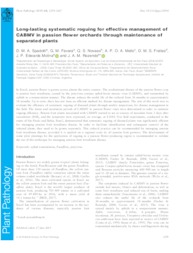Long-lasting systematic roguing for effective management of CABMV in passion flower orchards through maintenance of separated plants.
Long-lasting systematic roguing for effective management of CABMV in passion flower orchards through maintenance of separated plants.
Author(s): SPADOTTI, D. M. A.; FAVARA; NOVAES, Q. S.; MELLO, A. P. O. A.; FREITAS, D. M. S.; MOLINA, J. P. E.; REZENDE, J. A. M.
Summary: In Brazil, passion flower is grown across almost the entire country. The predominant disease of the passion flower cropis passion fruit woodiness, caused by the potyvirus cowpea aphid-borne mosaic virus (CABMV), and transmitted byaphids in a nonpersistent manner. The disease reduces the useful life of the orchard from 36 months to approximately18 months. Up to now, there has not been an efficient method for disease management. The aim of this work was toevaluate the efficiency of systematic roguing of diseased plants through weekly inspections, for disease management inthe field. The latent and incubation periods of CABMV in passion flower vines were determined in order to optimizeroguing efficiency. Passion fruit plants inoculated with CABMV started to act as sources of inoculum from 3 days afterinoculation (DAI), and the symptoms were expressed, on average, at 8 DAI. Five field experiments, conducted in thestates of S~ao Paulo and Bahia, Brazil, demonstrated that systematic roguing of diseased plants was significantly efficientfor managing passion fruit woodiness disease. In order to facilitate identification and subsequent removal of theinfected plants, they need to be grown separately. This cultural practice can be recommended for managing passionfruit woodiness disease, provided it is applied on a regional scale by all passion fruit growers. The development ofsome pilot plantings for the application of roguing in a passion flower-producing region is recommended to validatethe use of this technique for managing passion fruit woodiness disease.
Publication year: 2019
Types of publication: Journal article
Unit: Embrapa Semi-arid Region
Observation
Some of Embrapa's publications are published as ePub files. To read them, use or download one of the following free software options to your computer or mobile device. Android: Google Play Books; IOS: iBooks; Windows and Linux: Calibre.
Access other publications
Access the Agricultural Research Database (BDPA) to consult Embrapa's full library collection and records.
Visit Embrapa Bookstore to purchase books and other publications sold by Embrapa.

